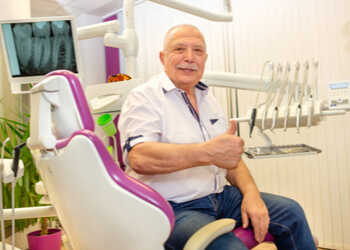If you are wondering ‘are dental implants safe’, it’s important to remember that even though implants have an up to 98% success rate, as with any kind of surgery, dental implant surgery carries with it some element of risk. Keeping yourself healthy and managing your dental health is part of your role in managing your safety. Your dentist will take precautionary measures aimed at protecting you too. Let’s take a look at some of the risks and possible side effects of dental implants and how they can be managed when you choose DDSS.
Are Dental Implants Safe?
Dental implants have a very high success rate and dental implant surgeries have been performed for more than 50 years. As such, dental implants are considered safe and predictable.
The technology and skill that goes into implants and the dental implant procedure has been improved over time, and practitioners are more diligent than ever at managing patient risk factors to ensure a favourable outcome for you.
Much of the risk of dental implants arises from the surgical component. Making incisions causes bleeding, swelling and tenderness. At DDSS and DDII we are proud to offer our patients the opportunity to minimise risks through digital dental implants.
This procedure is minimally invasive and because incisions are not made, it can reduce your chances of developing an infection at the implant site.
What Are The Benefits Of Dental Implants?
Dental implants are permanent tooth replacements that are surgically embedded into your jaw. The implant is a titanium screw that will become integrated with your jaw bone over a period of time. At the end of it, it will have fused to the jawbone to create a strong foundation. This means you will be able to smile, bite and chew with comfort and confidence.
Several surgeries may be required in order for this to take place, and for your implant surgery to be successful, and several risk factors need to be avoided.
Some of these include:
- An infection at the implant site
An infection could cause your implant to fail. When you have a digital dental implant procedure your chance of infection is reduced because there is no incision.
- Rejection of the implant by your body
Although rare, it is possible for the body to perceive the implant as a foreign object and reject it.
- Allergic reaction to the implant
Some patients have metal allergies and cannot have titanium implants. Your experienced DDSS dentist will discuss this with you in more detail.
- Problems with the sinuses
Sometimes dental implants placed in the upper jaw can protrude into the sinus cavity. Using digitally guided implant technology helps your dentist to find the correct placement for your implant, and reduce the chances of this happening.
Of course working with an experienced and suitably qualified practitioner makes these side effects much less likely to occur. At DDSS we are committed to providing our patients with state-of-the-art technology and an experienced team of professionals, for the best possible results.
Pre-Surgical Screening
Dental implants are likely to be successful in patients who have healthy gums and jaws.

- Patients with untreated tooth decay
- Patients who have active periodontal disease
- Patients with inadequate or weak jawbones
- Patients with uncontrolled diabetes
- Patients who smoke
Managing Problems With Dental Implants
The majority of dental implants are manufactured from titanium, because it is affordable and durable. It can also withstand the forces exerted with biting effectively.
And, even though titanium is generally safe there are some potential risk factors:
Corrosion may occur
Once a titanium implant degrades, it may be subject to corrosion. This can make the implant uncomfortable and it will inevitably need to be replaced.
Titanium allergies
Some patients may be allergic to titanium and would not be eligible for titanium dental implants.
Managing the risks associated with bone grafting for dental implants
Bone grafting helps patients with inadequate jaw bone to have a chance with implants. By taking bone from somewhere else in your body and placing it in the implant site, you may be able to stimulate new bone growth.
Bone grafting is a surgical procedure and so does involve the risk of infection. Your dentist will make an incision that will be stitched up and you will need to practice very good dental hygiene to ensure that your mouth is free of infection-causing bacteria.
Failure to osseo-integrate
An unstable implant is likely to fail quite soon after surgery. This is because during the healing period, the bone around your implant grows around it and fuses to it resulting in a stronger more stable implant. A lack of fusion gives the implant no anchorage.
If you suffer from a condition that inhibits your body’s ability to heal itself, your dental practitioner would not admit you for surgery. Granted, there are cases where an implant fails unexpectedly, however in the majority of cases, a thorough medical history can gauge if your implant is likely to fail.
Perforations during surgery
There have been cases of perforation during dental implant surgery, whereby the surrounding teeth, soft tissues, sinuses or nerves have been damaged. This can occur if the implant is not correctly positioned or if the dentist’s drill or other instruments come into close contact with the aforementioned areas of the mouth.
When carefully planned and performed by an experienced and qualified dental practitioner and with sound dental care, your dental implants could last for the rest of your lifetime.
Any major risk factors will be managed by your dental practitioner and any side effects and are mild and manageable. Still want to know ‘are dental implants safe’?
Please contact our practice for the most convenient appointment:
Sydney CBD: (02) 8294 5812
Gosford: (02) 8294 8656






